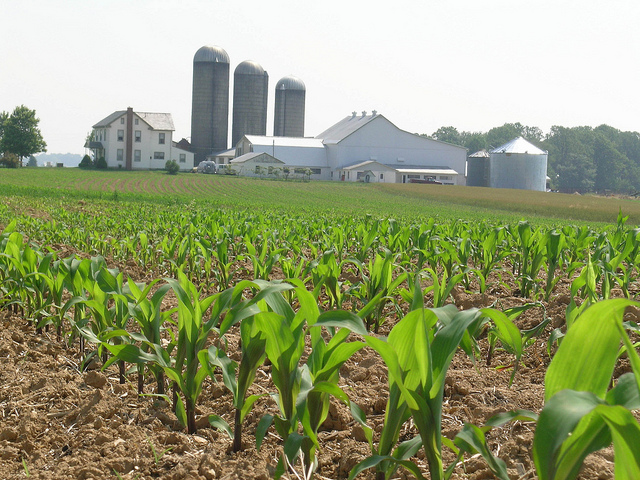Chester County Ag Notes: Corn Yields Sextuple in 80 Years

Spring is the time for planting corn so farmers are hoping that dry weather will enable them to plant the 93.6 million acres that are forecast to be planted across the whole country this year; 6 percent more than last year. Typically almost 370 of our 1,700 Chester County farms will be planting corn for grain and another 276 farms growing corn for silage and green chop to feed their dairy cows.
The technology for corn cultivation has changed beyond all recognition since the 1930s. Yields were around 30 bushels an acre in those days whereas in 2014 average yields were 171.6 bushels per acre. We would have needed more than 571 million acres to produce the volume produced in 2014.
Every aspect of producing corn has changed since the 1930’s. The early emphasis was on the use of hybrid seeds and applying fertilizer but has since expanded to cover every aspect of cultivation.
Incidentally the record corn yield in 2015 was over 500 bushels per acre and many of our local farmers were averaging over 200 bushels per acre. Seed companies are confident that yields will continue to rise.
The current emphasis is on precision to optimize yield and minimize adverse impact on the environment. Tractor cabs contain computers linked to GPS so that sensors can avoid overlapping sprays, overseeding and to be able to record grain yield across each field. Computers, software and data are becoming increasingly critical to the modern farmer.
Research has shown that early sowing is advantageous. All seed must be purchased each year because it was found that yields could be increased 20% or so by using the seed produced by crossing two carefully chosen inbred lines to produce hybrid seed.
All the seed is treated with minute amounts of fungicide to protect the developing seedling and modern drills are able to ensure seed is placed at the optimal depth in the soil for germination.
Most of the corn seed is GMO so that farmers do not have to apply separate applications of insecticides to control insects that attack the roots and the ears. The other GMO trait facilitates weed control and allows use of the herbicide, glyphosate that does not leach in the soil.
Fertilization is also critical because producing such a large crop requires a lot of nutrients from the soil. Applying manure and planting appropriate cover crops can provide some of the nutrients but rarely in sufficient quantities to supply total plant needs.
Many farmers use yield monitors at harvest linked to the GPS in the tractor cab so that the right amount of fertilizer can be delivered to the next crop for each part of the field. Nutrients are also applied at the time when the crop needs are greatest.
Corn is the only major food crop that originated on this continent. The Middle East – the “Fertile Crescent”- provided wheat, barley and oats, soybeans came from China and rice originated in South Asia. Corn evolved 7,000-9,000 years ago in Central America and has since spread worldwide and is one of the major crops with wheat and rice in feeding the world.
 It would be difficult to think that it would be possible to develop such a huge seed cob and major food crop from the Mexican grass teosinte.
It would be difficult to think that it would be possible to develop such a huge seed cob and major food crop from the Mexican grass teosinte.
Thirteen percent of US corn production was exported in 2013 to over 100 countries and the USA is the major global supplier. Over 30 percent of US production is now used for the production of ethanol and an estimated $7.6 billion was saved as a result with lower CO₂ emissions.
A small amount is used to produce food and industrial products. The remaining corn is used for livestock feed. Locally it may be marketed by Hostetter to the huge poultry industry in Maryland or used by our farmers to feed their own livestock.
_________
 Duncan Allison gained degrees in horticulture and extension education in the UK and US and spent most of his career working for the DuPont Company developing and marketing crop protection chemicals. Recently he has written reports for a global ag publisher and for New Jersey-based international business consultants Kline & Co. For the last 16 years he has been heavily involved in the local farming of Chester County where he has lived with his wife and family since 1980. Contact Duncan directly via email at duncan13@comcast.net.
Duncan Allison gained degrees in horticulture and extension education in the UK and US and spent most of his career working for the DuPont Company developing and marketing crop protection chemicals. Recently he has written reports for a global ag publisher and for New Jersey-based international business consultants Kline & Co. For the last 16 years he has been heavily involved in the local farming of Chester County where he has lived with his wife and family since 1980. Contact Duncan directly via email at duncan13@comcast.net.
Connect With Your Community
Subscribe to stay informed!
"*" indicates required fields






















![95000-1023_ACJ_BannerAd[1]](https://vista.today/wp-content/uploads/2023/03/95000-1023_ACJ_BannerAd1.jpg)

























